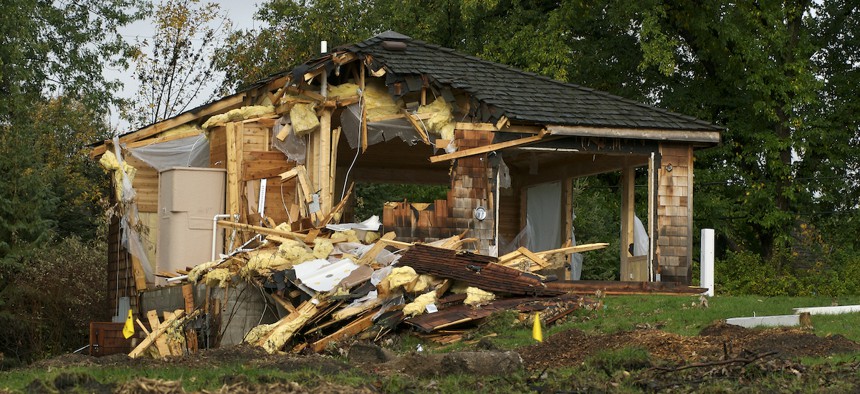Why cities are turning to AI for property assessments

ArtBoyMB via Getty Images
The technology can identify flaws or damage to infrastructure more efficiently than humans, which experts say can help streamline efforts to improve housing conditions and availability in communities.
The U.S. is facing an affordable housing shortage, with communities experiencing an estimated gap of 7.3 million affordable and available homes for the nation’s lowest-income renters. At the same time, many jurisdictions are looking to beautify their neighborhoods by cleaning up damaged or vandalized areas to be more attractive for residents. Some cities are tapping artificial intelligence to address their housing woes.
Restoring properties to create affordable and available housing can be a herculean task when done manually, said John Nolte, president of Geospatial Professional Network, a nonprofit association for professionals using geographic information systems and other information technologies in government.
In an email to Route Fifty, Nolte explained that traditionally, “property assessments and code enforcement largely … [required] staff to physically drive through neighborhoods. The introduction of aerial and oblique imagery allowed for remote inspections from the office, but these still involved manual, time-consuming review processes and often relied on reports from other agencies or citizens.”
Still, “this approach was limited in scope and prone to delays, which sometimes resulted in missed violations or properties falling into disrepair,” Nolte said. Such setbacks can deplete already scarce housing resources for communities, which is where AI can help ease the bottleneck of properties that need to be inspected.
“AI models … enable a comprehensive, rapid evaluation of entire municipalities, vastly improving coverage and detection capabilities,” Nolte said. “This allows enforcement teams to proactively identify and address issues across the whole city much more efficiently than traditional methods.”
In California, the cities of Lancaster and Rancho Cordova are turning to AI in their efforts to repair and preserve property in their communities. The cities recently partnered with City Detect, a provider of AI-enabled property and code enforcement solutions, to evaluate property conditions, such as code violations or damage.
With data collected from vehicle-mounted cameras, the cities’ code enforcement departments can then leverage City Detect’s tech platform to automate the detection of violations or other issues in neighborhoods. A team of AI, web application and hardware and software engineers help develop models for cities that identify infrastructure or property issues officials want to prioritize, like dilapidated buildings or graffiti, said Gavin Baum-Blake, CEO and co-founder of City Detect.
Leveraging AI to evaluate property and infrastructure is not a new concept, with states and localities increasingly experimenting with the technology to identify damaged rooftops in Baltimore or detect graffiti on infrastructure in Washington in recent years.
Before 2021, for instance, “there wasn’t a lot of discussion about AI or computer vision models,” Baum-Blake said. But as agencies uncover how AI can be integrated into more and more government services, municipalities across the U.S. “are getting excited and looking for additional ways in which to utilize AI to help solve … problems” like property assessments.
Plus, addressing issues or potential concerns in a community early on in the process — without having to wait for a constituent to complain — can help reduce the number of inquiries from residents, and in turn, build their trust in governments, Baum-Blake said. In government there’s a “big push of going from reactive … to proactive” responses to problems in a community, he said.
“Given ongoing budget and capacity constraints,” Nolte said, “leveraging AI for property assessments, “holds great promise by enabling municipalities to assess properties quickly and accurately without the need for physical inspections.”
While AI can be a powerful tool, “it is important to ensure municipalities establish policies for the use of AI, especially with the potential for the applications to replace staff,” he said. “The models also need to be trained accurately to produce the best results, this still requires validation of the data.”






